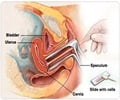Early administration of HPV vaccine reduces risk for cervical cancer.

Cervical cancer progresses through different stages. Initially, cells lining the cervix show some abnormalities called dysplasia that can be detected on a Pap smear. These cells could result in a pre-cancerous state called 'Cervical Intraepithelial Neoplasia' (CIN). CIN could be low or high grade depending on the extent of the abnormality. It could further progress to form squamous intraepithelial neoplasia or carcinoma in situ. These could spread to the surrounding tissues resulting in an invasive cancer.
A study was conducted in Victoria, Australia to study the impact of HPV vaccination program on the incidence of cervical cancer. HPV vaccination was recently introduced for all women in Australia between 12 and 26 years of age between the years. The researchers studied the incidence of low grade abnormalities or LGA (which included low-grade squamous intraepithelial lesions and atypical squamous cells of undetermined significance) detected on Pap smear and high grade abnormalities or HGA (which included cervical intraepithelial neoplasia of grade 2 or worse or adenocarcinoma in situ) detected on the cervical tissue sample obtained using a procedure called colposcopy. Invasive cancers were classified separately.
The authors found that there was a significant decrease of 38% in HGA in girls below 18 years of age within 3 years after the introduction of the HPV vaccine.
The researchers thus conclude that early administration of HPV vaccine before a girl becomes sexually active helps to reduce the incidence of cervical cancer. However, longer duration studies are warranted to study if the vaccine can protect from cervical cancer in the longer term.
Reference:
Source-Medindia














